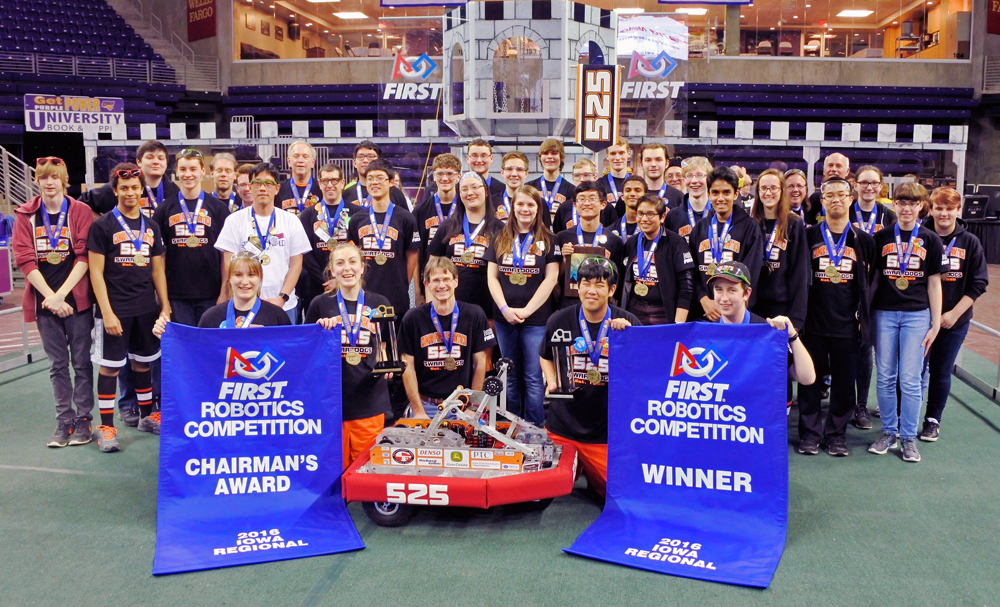
This story was originally posted with the Iowa State News Service.
When it launches basketball-sized “boulders” at a castle tower, the robot built by a team of students from Cedar Falls High School can’t see over defending robots.
So, at 8:30 on a recent school night, team members were at school, working to solve the problem.
They’ve found a camera and have done tests to make sure it will work with their machine. Now they have to figure out how to mount it for an eagle-eye view of a game field designed to look like a medieval battlefield.
But there wasn’t much time for research and development. The team is heading to the FIRST Championship April 27-30 in St. Louis. Another six teams and six individuals from across the state have also earned trips to the championship.
The championship is a chance for students across the FIRST lineup of programs to gather in one place and demonstrate what they’ve researched, built and learned.
FIRST (For Inspiration and Recognition of Science and Technology) is a nonprofit organization based in New Hampshire dedicated to inspiring young people to explore science and technology. It sponsors four programs: elementary-level FIRST LEGO® League Jr., elementary- and middle school-level FIRST LEGO® League, middle- and high school-level FIRST Tech Challenge and high school-level FIRST Robotics Competition.
This was the first year Iowa teams in all four FIRST programs could attend championship-qualifying events within the state. In the past, robotics teams had to travel to out of state for all of their events. And, Iowa State, the University of Iowa and the University of Northern Iowa were all involved with FIRST programs this year.
“For all of these programs, it’s really nice to see Iowa students can work with others on a global level,” said Camille Sloan Schroeder, the K-12 community outreach manager for Iowa State’s College of Engineering, the director of Iowa FIRST LEGO® League and a former member of the planning committee for the world championship.
“People are constantly saying to kids, ‘The world is flat,’” she said. “So it’s great for the Iowa students to see designs, perspectives and cultures of teams from other countries. They can see the different ideas people from other places bring, begin to understand the value in those differences and appreciate similarities.”
Championship organizers say the event is all about helping kids from around the world understand the many opportunities in science and technology – not mention more than $25 million in college scholarships.
“Our planet’s future depends on today’s kids becoming the innovators, doers, and tinkerers of tomorrow,” the organizers wrote on the event’s website. “That’s why FIRST exists – to influence young people to embrace science, technology, engineering, and math (STEM) as educational and professional career paths.”
Career paths weren’t exactly the order of the day back at Cedar Falls High School. Time was running out to engineer an attachment that could get a camera high over the battlefield.
But team members can’t just pull out their robot and start making changes, said Noah Wolf, a junior on the team.
“We have six weeks to build a robot and then it goes into a bag,” he said. “We can’t use it. We can’t work on it. We can’t touch it between competitions.”
So the team has built a second, practice robot for training runs and technical fixes.
It’s a lot of time and work. But the students say they don’t mind.
“When I first started as a freshman, I wasn’t here as much,” said Kayla Neese, a Cedar Falls senior who plans to study at Iowa State. “But I realized I missed a lot. Now I try to be here as much as I can. I also like to be here to help the younger students learn.”
The team’s coach – Kenton Swartley, who teaches physics at Cedar Falls High – said there are 32 students out for robotics this year. He’s been coaching the team since 1999 and this will be the team’s eighth trip to the world championship.
“The obvious reason we’ve done this so long is the challenge,” he said. “It’s an intriguing challenge year after year. The students design and build these robots and learn a lot as they’re going.”
He said it’s also a great opportunity for students to work with engineers and other adult mentors. And, he likes the way the contest promotes values such as “gracious professionalism” and “coopertition.”
Even though many of his students have been to the championships before, he said it’s still a big event for them.
“There’s the realization that STEM opportunities can be exciting,” he said. “And they get to see some amazing robots, some just really fabulous designs.”